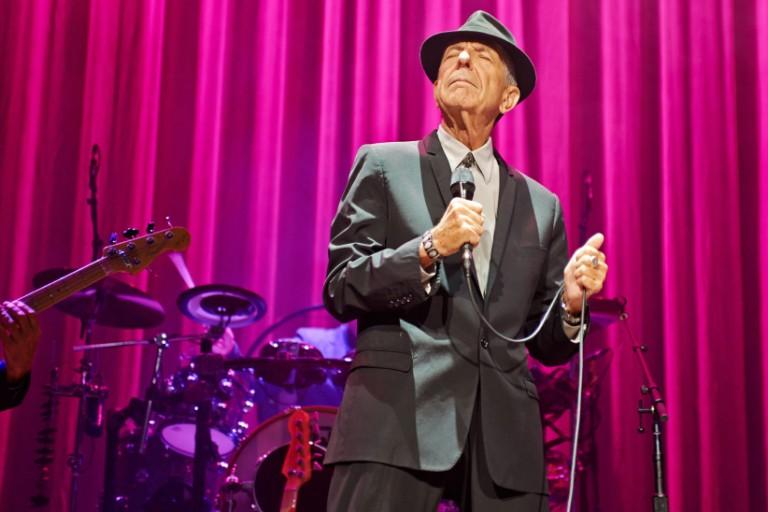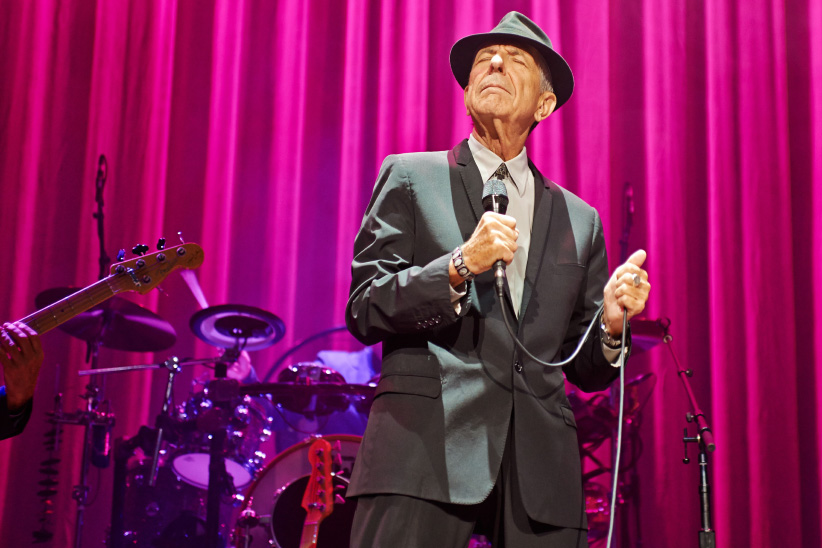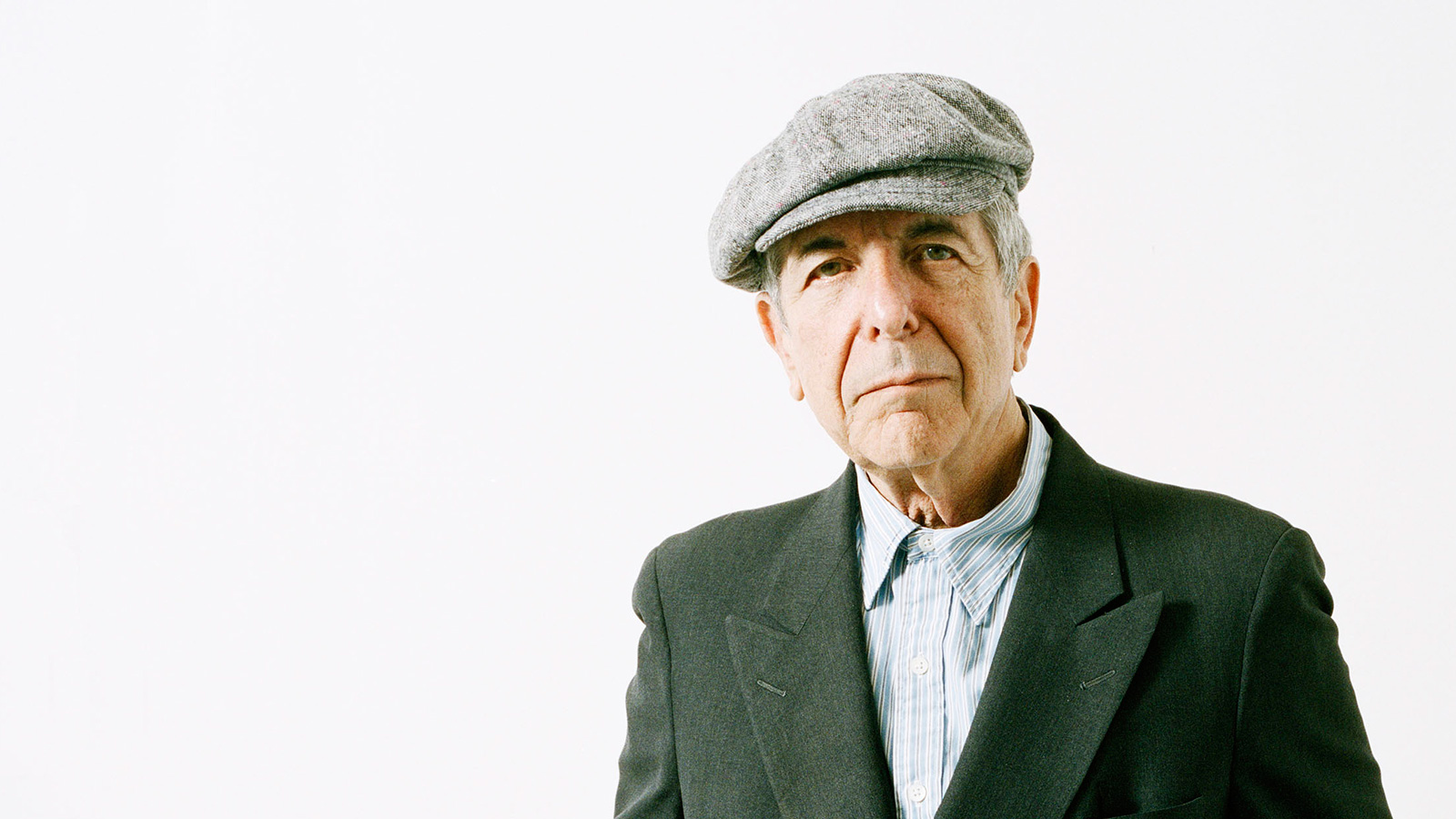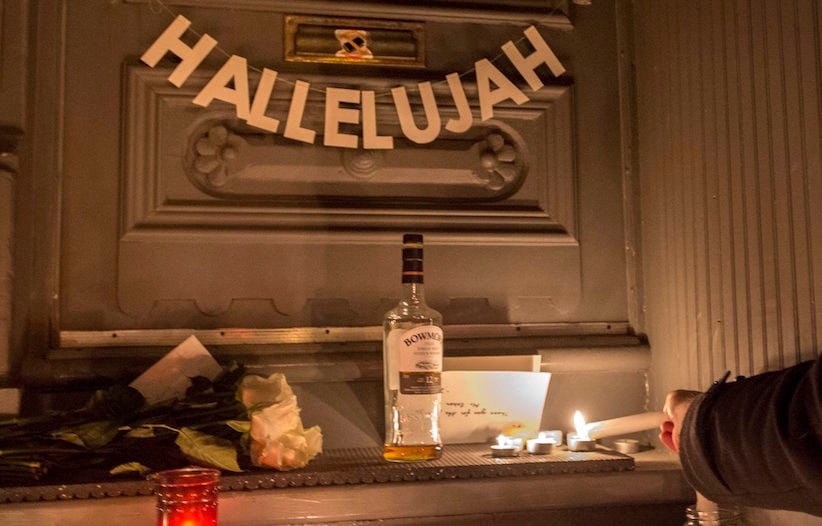Saying goodnight to the grocer of despair
A look at Leonard Cohen’s remarkable later years, a fairy-tale redemption that masked the darkness that truly defined his career

Leonard Cohen performs on stage at Leeds Arena in Leeds, England. (Gary Wolstenholme/Redferns/Getty Images)
Share

The week Leonard Cohen died, it seemed everyone wanted to quote 1992’s “Anthem”: “There is a crack in everything / That’s how the light gets in.” It’s an inspirational lyric that fits nicely beside a JPEG of flowers growing through concrete. Circulated on social media, it was a way for Cohen fans to retain some semblance of hope after the death of their idol, announced two days after the U.S. election results.
Optimism is practically heroic these days, but it doesn’t seem very Cohen-esque. Most radio and TV stations played “Suzanne” or “Hallelujah” to remember the man. Precious few—if any—played the title track from You Want It Darker, the album that came out weeks before Donald Trump became president-elect: “If you are the dealer, I’m out of the game . . . You want it darker, we kill the flame.” That entire track is the ultimate mic drop from the man who told us 24 years ago that he had “seen the future, brother, and it is murder.”
In these last eight years of Leonard Cohen’s remarkable comeback, his unprecedented victory lap that began at age 75, the image we have of the Montreal poet is that of a dapper, elderly man, a class act with a slick band who gets everyone clapping along to “Closing Time,” a man on an endless tour to regain a small fortune swindled from him. It’s a feel-good tale of redemption. His songs are featured on TV singing competitions—particularly “Hallelujah,” which is sung by pop stars and kindergarten students and somehow sprung up in everything from Shrek to the Olympics. (Actual headline last week: “Genius songwriter of music from Watchmen sex scene dead at 82.”)

Looking at that eloquent, funny and generous man we now know, it’s almost easy to forget that Cohen was an artist who battled clinical depression for most of his life, who had nicknames like “the grocer of despair,” whose early albums were described by reviewers as “music to slit your wrists by.” Even during his fabled third act, he would tell us straight up: “I caught the darkness, baby / And I got it worse than you.” Then there’s “Hallelujah” itself, which is not a tale of triumph or eroticism or sweetness. In fact, “it’s a cold and broken Hallelujah,” one from a narrator who says “all I ever learned from love is how to shoot at someone who outdrew you,” for whom the title phrase is an act of submission and sure as hell not a victory march. It’s an act of humility—which is why Kate McKinnon sang it in character as Hillary Clinton on the first Saturday Night Live after the election. Like any song, of course, you can choose to hear the complexity or simply appreciate the melody: a paradox Cohen built into the lyrics themselves: “There’s a blaze of light in every word / it doesn’t matter which you heard, the holy or the broken Hallelujah.”
In the beginning of his recording career, which he began at the ripe age of 32, Cohen hoped his records could speak for themselves and he would never have to tour. “I can’t sing and I can’t perform,” he told Judy Collins, the popular folk singer who covered five of his songs before he had a record deal, including the explicitly suicidal “Dress Rehearsal Rag.” She urged him to join her on stage at a benefit show in February 1967. He sang half of “Suzanne” until he stopped abruptly and left the stage.
On his first-ever tour, in 1970 after his second record, his band called him “Captain Mandrax,” because of the amount of Quaaludes he was taking. That year he played in front of 600,000 people at the Isle of Wight festival in Britain, going on after Jimi Hendrix. At a festival show in France, he took to the stage riding a white stallion, which reared while Cohen saluted the audience. On that same tour, after a particularly revelatory acid trip, Cohen told his band that he wanted to play mental hospitals on days off between gigs. Cohen told a journalist that he thought psychiatric patients “would especially qualify to be a receptive audience for my work”—because, he reasoned, by committing themselves to care they had already conceded a form of defeat, and so “there would be empathy with the experience documented in my songs.” Cohen embraced these audiences, often literally.

These were his people, the broken and the disappointed. Cohen’s music was that crack letting light in; his whole life he received letters expressing how his music and words saved someone from the brink, how even at its most desolate his work could inspire those who ever felt “like a drunk in a midnight choir,” who tried in their own way to be free. He was capable of brilliant self-laceration; one 1972 poem contains perhaps the best encapsulation of writer’s block: “F–k the 26 letters of my cowardice.” Cohen fans were an exclusive club, his records trafficked like secrets among musicians and writers, passed between sympathetic English teachers and misfit students. In 2004, Cohen set to music one of his favourite poems from mentor F.R. Scott: “From bitter searching of the heart, we rise to play a greater part.”
This poem saves lives.https://t.co/ofrdXooMJ2 pic.twitter.com/TI5PZRQLyW
— Helen Spitzer (@HelenSpitzer) November 11, 2016
Cohen’s commercial appeal was extremely limited; for much of his 50-year recording career, the idea of him headlining hockey arenas would have been laughable. Following an initial burst of attention with his 1967 debut, even Europe tired of his shtick after the first couple of increasingly depressing records. Various Positions, the 1984 album featuring “Hallelujah,” wasn’t deemed worthy of a U.S. release by his record company, which was busy making millions with blockbusters by Michael Jackson and Bruce Springsteen. Beautiful loser, indeed.
It wasn’t until 1988’s I’m Your Man, which launched his first comeback, that Cohen became known for his sense of humour; on the cover, he’s pictured eating a banana. Songs like “Tower of Song,” “I Can’t Forget” and the title track are full of zingers; even the bleak “Everybody Knows”—or, later, “The Future”—is as wry as it is nihilist, in the best tradition of intellectual Jewish wit. But if his lyrics could still be piercing, the instrumentation surrounding them was considerably softer around the edges—which befits a man born before Elvis Presley, but it also meant that Leonard Cohen’s music became polite. That’s a large part of his later success. But it’s a veneer, a mask he wears for you. It’s also a sonic embodiment of a constant thread through Cohen’s work: seemingly unimaginable pain surrounded by the sublime mysteries of the world, the notion that such a dichotomy, in fact, makes us whole.
“The news is sad, but it’s in a song so it’s not so bad,” wrote Cohen in his debut novel, 1963’s The Favourite Game. In 2011, he accepted Spain’s Prince of Asturias Award for Letters; the jury called him “one of the most influential authors of our time.” Cohen always treated acceptance speeches as poetic opportunity, and this one was no different. “If one is to express the inevitable defeat that awaits us all,” he said, “it must be done within the strict confines of dignity and beauty.” Preferably delievered, no doubt, in a suit and fedora and via a baritone aged like the finest wine.